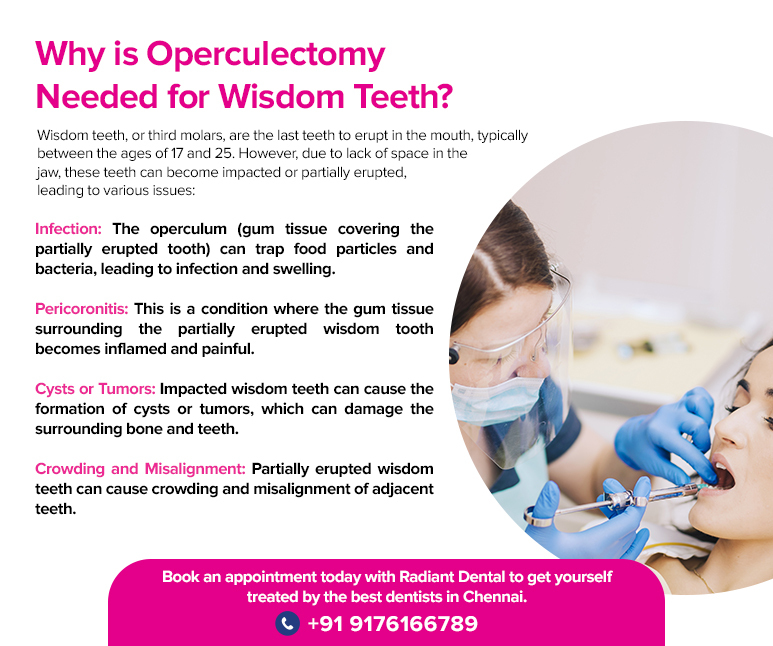What is Operculectomy Surgery Related To Wisdom Teeth


Wisdom teeth, those late-blooming molars, have a knack for causing trouble. When they fail to erupt properly, they can lead to pain, swelling, and even infections. In such cases, a surgical solution called an operculectomy may be the answer. This procedure involves removing the operculum, the gum tissue covering the partially erupted tooth, allowing for proper healing and relief.
If you’ve been suffering from problematic wisdom teeth, this blog will guide you through the operculectomy process, guiding you through what to expect and why it might be necessary. Prepare to gain valuable insights into this dental dilemma and the surgical remedy that could restore your comfort.
What is Operculectomy?
An operculectomy, also known as an operculectomy procedure, is a surgical procedure performed to remove the operculum, which is a piece of gum tissue that covers the crown of a partially erupted tooth. This procedure is often necessary when a wisdom tooth is impacted or partially erupted, causing pain, swelling, or other complications.
Why is Operculectomy Needed for Wisdom Teeth?
Wisdom teeth, or third molars, are the last teeth to erupt in the mouth, typically between the ages of 17 and 25. However, due to lack of space in the jaw, these teeth can become impacted or partially erupted, leading to various issues:
Infographic image content:
- Infection: The operculum (gum tissue covering the partially erupted tooth) can trap food particles and bacteria, leading to infection and swelling.
- Pericoronitis: This is a condition where the gum tissue surrounding the partially erupted wisdom tooth becomes inflamed and painful.
- Cysts or Tumors: Impacted wisdom teeth can cause the formation of cysts or tumors, which can damage the surrounding bone and teeth.
- Crowding and Misalignment: Partially erupted wisdom teeth can cause crowding and misalignment of adjacent teeth.
When these complications arise, an operculectomy wisdom tooth procedure may be recommended to remove the operculum and expose the crown of the tooth, allowing for better access and potential resolution of the issues.
The Operculectomy Procedure
The operculectomy procedure is typically performed under local anesthesia, although some cases may require general anesthesia. Here’s a general overview of the steps involved:
- Numbing the Area: The dentist or oral surgeon will numb the area around the affected wisdom tooth using a local anesthetic.
- Incision: A small incision is made in the operculum (gum tissue covering the tooth) to expose the crown of the partially erupted wisdom tooth.
- Removal of Tissue: The dentist or surgeon will carefully remove the operculum and any excess gum tissue surrounding the tooth.
- Cleaning and Dressing: The area is thoroughly cleaned, and a dressing or packing may be placed to promote healing.
After the procedure, patients can expect some swelling, discomfort, and minor bleeding, which can be managed with over-the-counter pain medication and proper aftercare instructions provided by the dental professional.


Operculectomy Cost
The operculectomy cost can vary depending on several factors, such as the location, the dentist’s or surgeon’s fees, and the complexity of the procedure. In general, the cost of an operculectomy can range from a few hundred dollars to several thousand dollars, depending on the specific circumstances.
It’s important to note that dental insurance policies may cover a portion of the cost, so it’s advisable to check with your insurance provider regarding coverage and any applicable deductibles or copayments.
Conclusion
An operculectomy is a surgical procedure that may be recommended for individuals experiencing complications due to partially erupted or impacted wisdom teeth. By removing the operculum (gum tissue covering the tooth), the procedure aims to alleviate pain, swelling, and potential infections.
While the cost can vary, it’s essential to follow your dental professional’s recommendations to ensure proper healing and prevent further complications related to wisdom teeth. Visit Radiant Dental Care to know more about wisdom teeth removal cost in Chennai.
FAQs
FAQ 1: What is the purpose of an operculectomy?
An operculectomy is performed to remove the gum tissue (called the operculum) that is covering a partially erupted wisdom tooth. This procedure helps expose the tooth, allowing for better access and prevention of potential complications like infection, swelling, or cyst formation.
FAQ 2: How long does the operculectomy procedure take?
The duration of an operculectomy can vary, but it is generally a relatively quick procedure, typically taking around 30 minutes to an hour. However, the exact time may depend on the complexity of your specific case and the number of teeth being treated.
FAQ 3: Is an operculectomy painful?
During the procedure, you will be given local anesthesia to numb the area, so you should not feel any pain. After the surgery, you may experience some discomfort, swelling, and mild pain, which can be managed with over-the-counter pain medication and following your dentist’s post-operative instructions.
FAQ 4: How long is the recovery time after an operculectomy?
The recovery time can vary from person to person, but most people experience some swelling and discomfort for a few days after the procedure. It typically takes about a week or two for the surgical site to heal completely. During this time, it’s important to follow your dentist’s instructions for proper oral hygiene and avoid strenuous activities that could delay healing.
FAQ 5: Can an operculectomy prevent the need for wisdom tooth extraction?
In some cases, an operculectomy can help resolve issues caused by partially erupted wisdom teeth without the need for full extraction. However, if the tooth remains problematic or fails to erupt properly after the operculectomy, extraction may still be recommended to prevent further complications.


